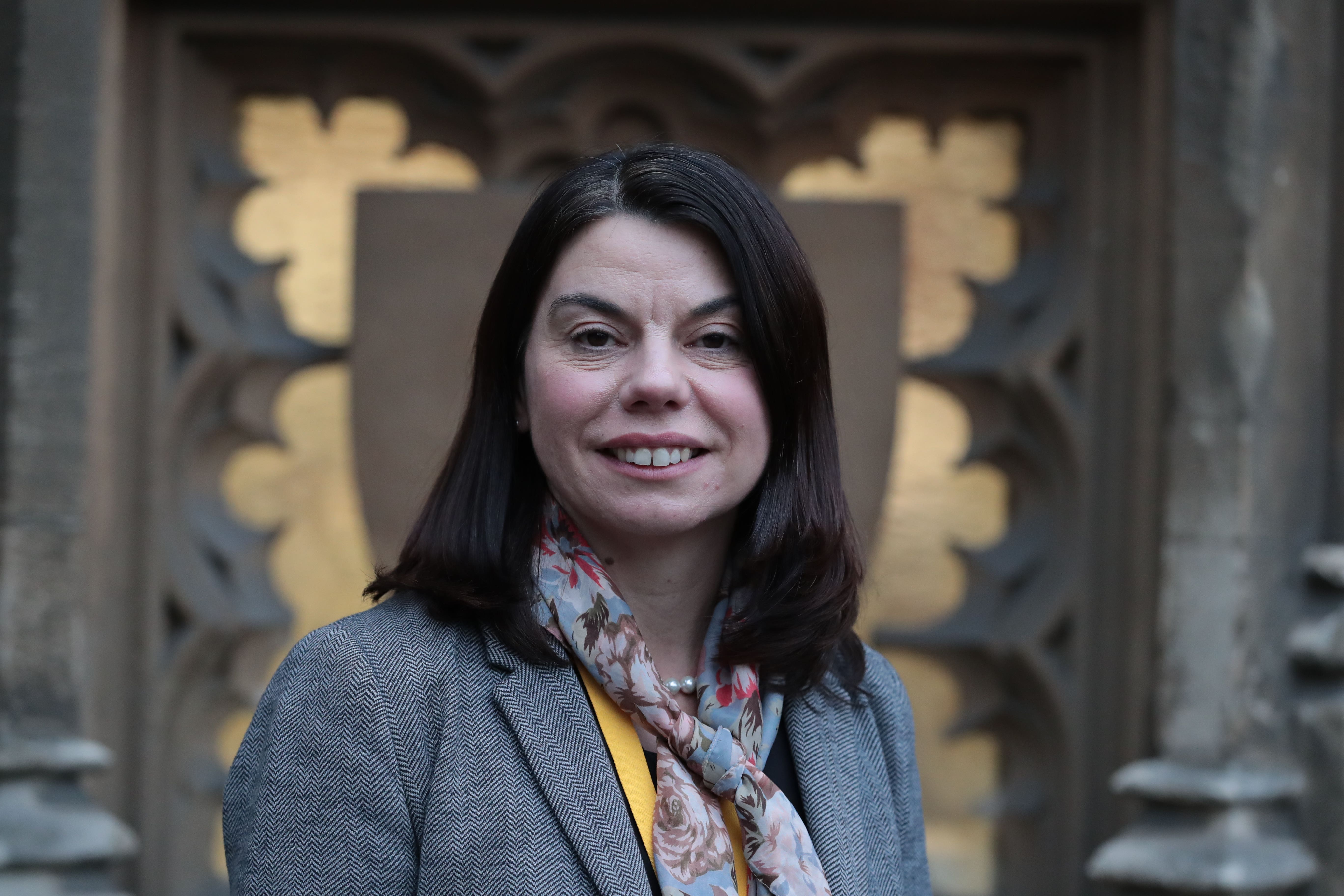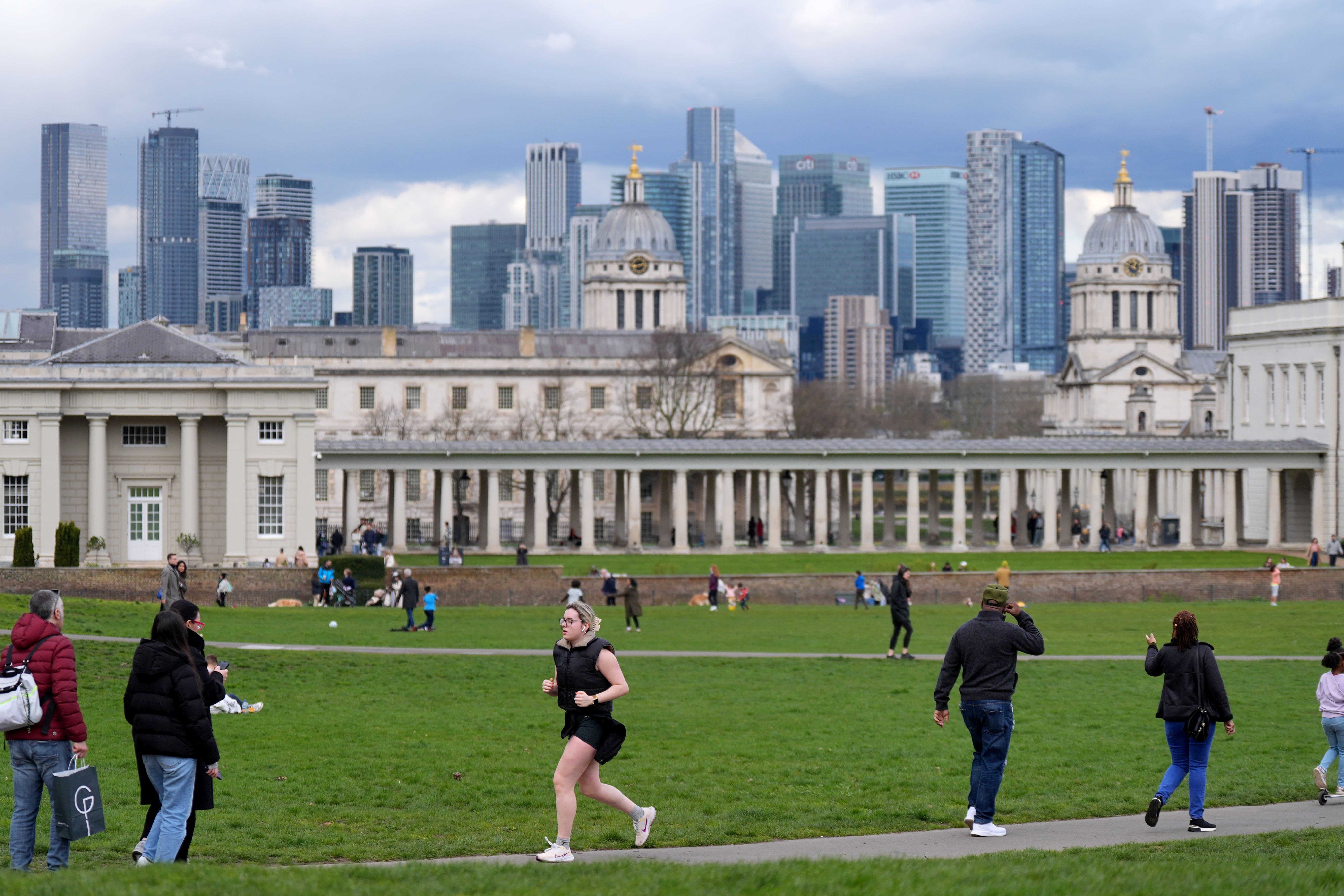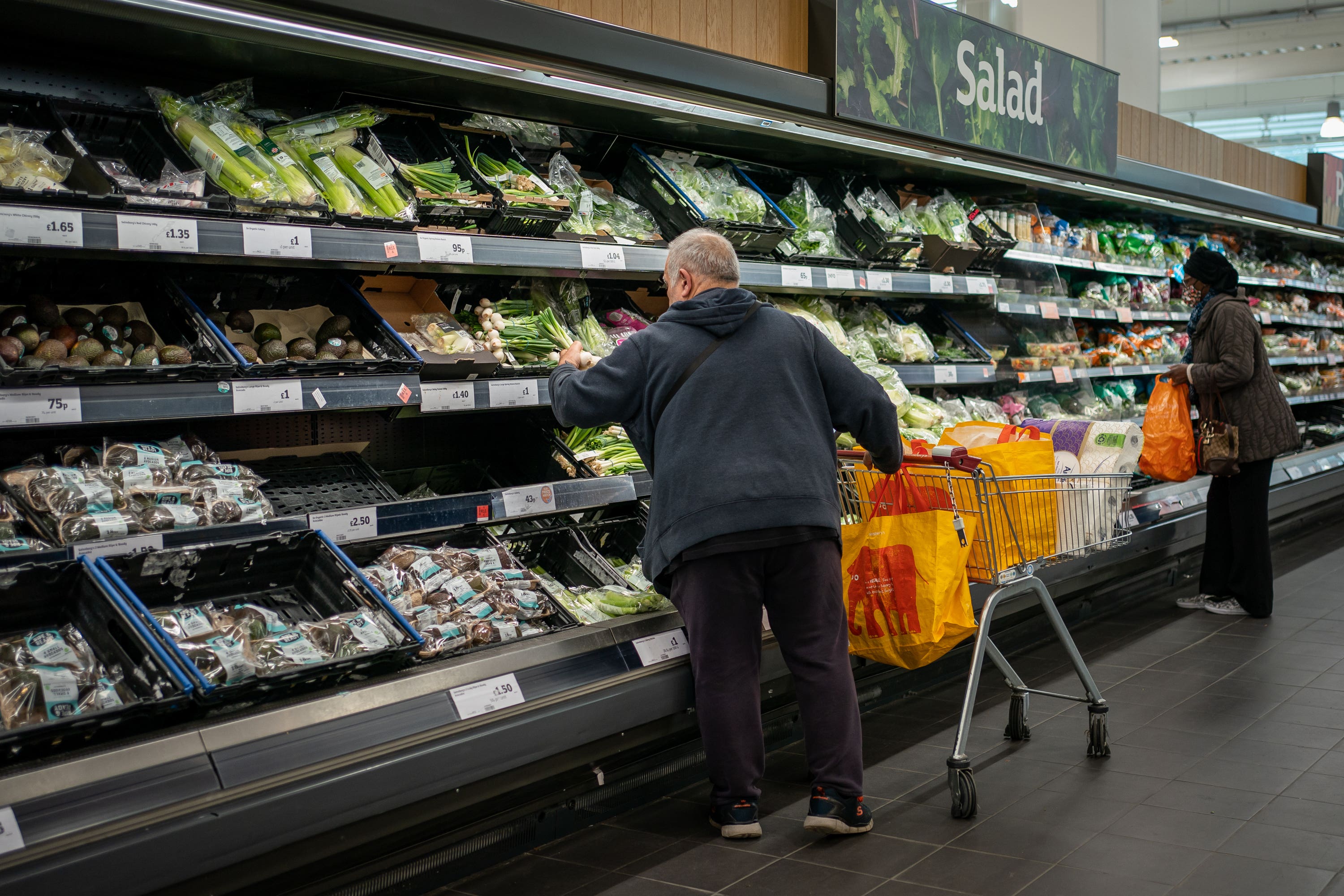UK inflation - live: Tories call for cut to interest rates despite market gloom over rising prices
Rate of Consumer Prices Index inflation falls to 2.3 per cent in April
Your support helps us to tell the story
From reproductive rights to climate change to Big Tech, The Independent is on the ground when the story is developing. Whether it's investigating the financials of Elon Musk's pro-Trump PAC or producing our latest documentary, 'The A Word', which shines a light on the American women fighting for reproductive rights, we know how important it is to parse out the facts from the messaging.
At such a critical moment in US history, we need reporters on the ground. Your donation allows us to keep sending journalists to speak to both sides of the story.
The Independent is trusted by Americans across the entire political spectrum. And unlike many other quality news outlets, we choose not to lock Americans out of our reporting and analysis with paywalls. We believe quality journalism should be available to everyone, paid for by those who can afford it.
Your support makes all the difference.Tories are calling for the Bank of England to cut interest rates despite market gloom over new inflation data.
Analysts say the chances of a cut in June are now slim after inflation fell to 2.3 per cent in April from 3.2 per cent in March - the lowest level in nearly three years - but above the 1.9 per cent to 2.1 predicted by some analysts.
But Sir Jacob Rees-Mogg, the former Conservative business secretary, argued the Bank should have cut rates already because “inflation is a lagging indicator.”
Paul Scully, a former minister, said cutting the rate would “bring relief to many who are fixing their mortgages for the next few years”.
Paula Bejarano Carbo, NIESR economist, added said persistent core inflation and strong wage growth data suggested the Bank “may exert caution at its upcoming meeting and hold interest rates, despite today’s encouraging fall in the headline rate.”
Suren Thiru, economics director at the Institute of Chartered Accountants in England and Wales, said a June cut was now “unlikely”.
Nobody will be feeling better off after latest figures - Lib Dems
Nobody will be feeling better off after the latest inflation figures, the Liberal Democrats said.
Responding to the latest inflation figures, Lib Dem Treasury spokesperson Sarah Olney said: “Nobody will be feeling any better off after today, with families still facing a £9 billion mortgage bombshell this year alone.
“Conservative ministers cannot celebrate today after presiding over the worst cost-of-living crisis in a generation.
“The aftershocks of this crisis will be felt for years to come, and the blame lies squarely with this incompetent government.
“The Conservative party should never again be trusted to manage the British economy.”

Martin Lewis explains what inflation fall means for interest rates
Martin Lewis has predicted that the Bank will cut interest rates in August rather than June following the lower than expected drop in inflation.
Watch the clip below:
Sunak: More work to do despite drop in inflation
Rishi Sunak has said there is still “more work to do” after inflation fell to its lowest level in three years but remained above what economists predicted.
“I understand that people are only just starting to feel the benefits of the improvements that we have made and that will take time for people to really feel them.” he said.
“But what we are now seeing is that everything is heading in the right direction.”
The prime minister added: “The economy grew in the first quarter of this year, faster than France, Germany and America.
“Wages have been rising faster than prices for almost a year now, energy bills are down hundreds of pounds now from where they were, mortgage rates are down from the peak and today’s news on inflation being back to normal is very welcome.
“If you put all of that together it shows we have got momentum, it shows that the plan is working but of course there is more work to do for people to really feel the benefits of all these things.
“That is why it is important that we stick to the plan. As I have said, these things don’t happen by accident.”
Recap: UK inflation falls less than expected to 2.3% in April
UK inflation has fallen by lower than expected, despite falling gas and electricity prices, dashing hopes that the Bank of England will lower interest rates at its next meeting in June.
The figures released by the Office for National Statistics (ONS) on Wednesday morning showed that the consumer price index was 2.3 per cent in April, down from 3.2 per cent in March.
Full report:

UK inflation falls less than expected to 2.3% in April
Getting inflation down to 2 per cent is also a key target for the Bank of England
Bank may want to see drop in service inflation before cutting rates
The Bank of England may want to see a further drop in service inflation before it cuts interest rates, a management consultancy has said.
Matthew Chapman, associate partner at McKinsey & Company, said: “Service inflation remains high. And there may need to be further downward movements in service inflation, real wage growth and the labour market before the narrative on monetary policy can start to change.
“While sharp drops in energy prices and easing food costs have helped push the CPI reading to a three-year low, prices are still substantially higher than they once were. And households are likely to continue adjusting their budgets as the cost of some everyday staples continues to rise at more than double the current rate of inflation. For example, breakfast cereals are up 7.4 per cent and vegetables like potatoes are up 7.9 per cent with the cost of crisps also rising 7.7 per cent.
“A return to the stable dynamics that prevailed before the Covid-19 pandemic still seems unlikely. Inflation is likely to still persist, growth sluggish and high interest rates may continue to create downward pressure on margins. To protect balance sheets, companies will need to remain vigilant and create opportunities to proactively react to cost and demand changes.”
June interest rate cut now ‘unlikely’ - institute of accountants
A cut to interest rates in June is “unlikely” after inflation fell less than expected, the Institute of Chartered Accountants in England and Wales has said.
Suren Thiru, ICAEW economics director, said: “This underwhelming drop in inflation suggests that the UK is rather stumbling back towards the Bank of England’s 2 per cent target, as lower energy bills had a smaller than expected impact on April’s headline rate.
“Concern over hotter than expected headline inflation is exacerbated by disappointing declines in core and services inflation, which suggest that the problem of underlying price pressures embedded in the wider economy have yet to be solved.
“The headline rate is set to drop markedly over the summer, once the expected decline in Ofgem’s energy price cap cuts people’s energy bills from July.
“Lingering concerns over underlying inflationary pressures mean a June rate cut is unlikely. However, these figures may convince more rate setters to vote to ease policy, providing a signal that a summer rate cut is still possible.”

Worst of cost of living crisis ‘not over’ - think tank
Many people are still facing lower living standards, a think tank has said as it warned that the worst of the cost of living crisis “is not over”.
Ben Harrison, director of the Work Foundation at Lancaster University, said: “Workers across the country might be quietly relieved that their bills and shopping are rising at the lowest level since 2021.
“But even at 2.3 per cent, inflation remains above the Bank of England’s target and many people will be facing lower living standards for some time to come.
“The truth is the worst cost of living crisis for more than 40 years is not yet over – most workers continue to face energy, food and housing costs that are much higher than three years ago.
“The sting in the tail is interest rates remain at a 16-year high of 5.25 per cent. And while there is no guarantee the Bank of England will cut interest rates soon, low paid and insecure workers are particularly exposed to record private rent increases and higher mortgage payments.”

Government borrowing in April higher than forecast in blow to chancellor
Chancellor Jeremy Hunt has been dealt a blow after official figures revealed borrowing for April overshot forecasts, hitting £20.5 billion, in the fourth-highest April since records began in 1993.
The Office for National Statistics (ONS) estimated that public sector net borrowing was £1.5 billion more than in 2023, partly pushed up by falling national insurance contributions.
Full report:

Government borrowing in April higher than forecast in blow to Chancellor
Public sector net borrowing came in £1.5 billion higher than in April 2023, partly pushed up by falling National Insurance contributions.
Hunt dodges question on whether he feels personally wealthier amid cost of living squeeze
Jeremy Hunt said it was “nothing to do with me” when asked if he personally felt wealthier following the cost-of-living crisis.
Asked by BBC Radio 4’s Today programme if he felt wealthier, the chancellor said: “It is nothing to do with me. It is to do with my responsibilities as chancellor.
“What I know when I became chancellor is we had the Office for Budget Responsibility saying we were going to have the biggest fall in living standards ever.
“We had the Bank of England saying that we were going to have the deepest, the longest recession for a hundred years.”
He pointed to cost-of-living support the government had offered, adding: “The result of those difficult decisions, and they were difficult because in the end we had to put up taxes for those decisions, but the result is living standards have gone up since Rishi Sunak became prime minister.”
In a testy exchange, Mr Hunt could earlier be heard to insist “me too” when host Emma Barnett said she was interested in people’s household finances.

Chancellor acknowledges people still feeling worse off
Jeremy Hunt has acknowledged that people were likely to be feeling worse off than they did a few years ago.
The chancellor said “two massive shocks” - the Covid pandemic and Russia’s war in Ukraine - were to blame for the drop in living standards.
Speaking to ITV’s Good Morning Britain programme, the chancellor said: “Do people feel better off now than a few years ago? No, because we have had something that you and I have never had in our lifetimes.
“We have had two massive economic shocks in quick succession so no, they don’t feel better than they felt a few years ago.
“The numbers show very clearly that since 2010 over a longer period of time living standards have improved, we have got four million more jobs, we have attracted more investment than anywhere in the world apart from China and the United States.
“The reason I am saying that is because this is an election year, people are going to make a choice about the future.
“When it comes to the important things that make a difference, the difficult decisions on having a flexible labour market, on getting taxes down so that we attract investment from overseas, a Conservative government will continue to take those difficult decisions.”
Watch some of the interview below:

Join our commenting forum
Join thought-provoking conversations, follow other Independent readers and see their replies
Comments